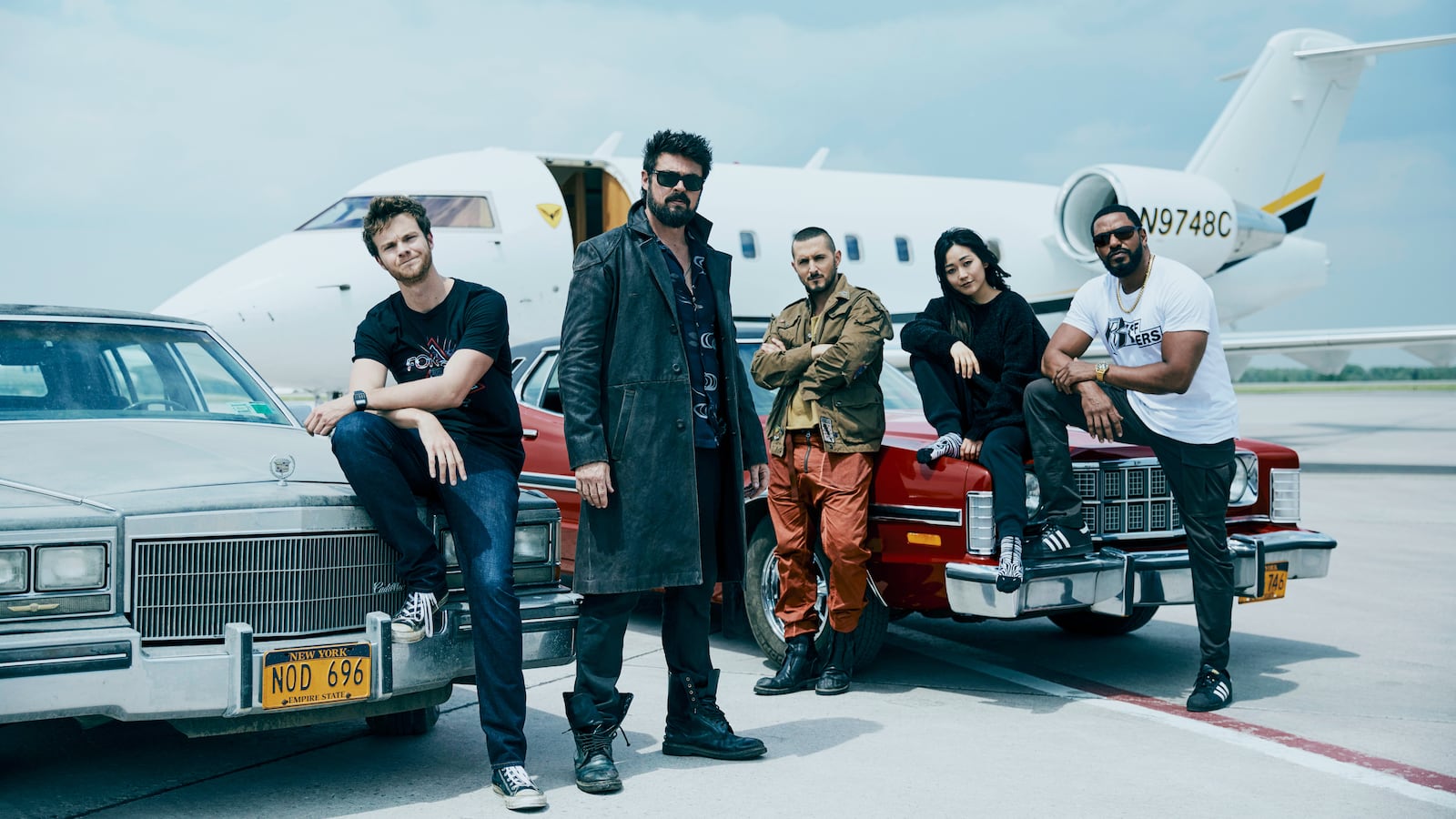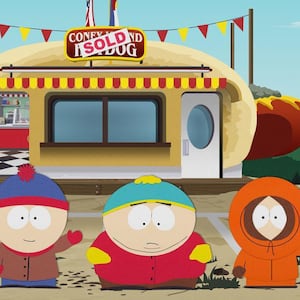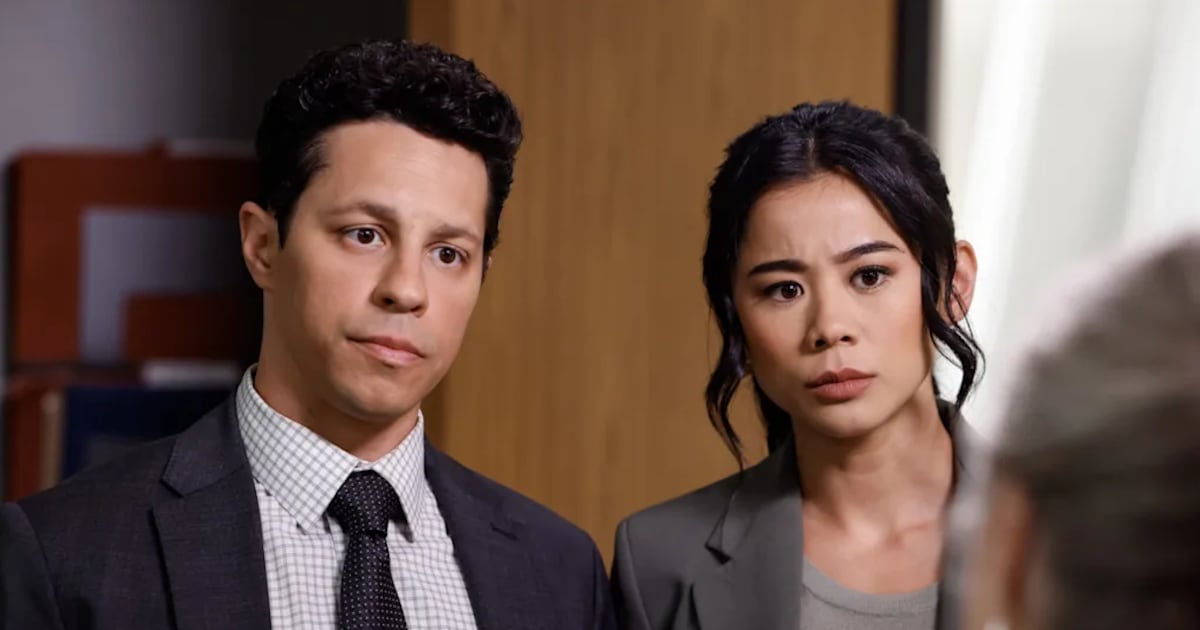The Boys isn’t subtle, and that’s key to its gonzo charm. Coming on like an off-the-rails freight train operated by a manic speed freak, it delivers degenerate superhero and sociopolitical satire with profane humor, grisly violence, and twisted psychosexual neuroses. As with its second season storyline about a neo-Nazi supe named Stormfront (Aya Cash) who pitch-perfectly embodied the spirit of this country’s white-nationalist MAGA hordes, it’s so pointed and true as to cut like a knife—or, in this case, like the laser beams blasting out of the eyes of all-American lunatic Homelander (Antony Starr), a blond-haired, blue-eyed man of steel defined by his grotesque mommy issues, corrosive insecurities, and terrifying fury.
Pent-up rage continues to be omnipresent in Season 3 (June 3) of Eric Kripke’s hit Amazon adaptation of Garth Ennis and Darick Robertson’s comic books. Be they normal humans or those bestowed with extraordinary abilities by Vought International’s Compound-V drug, just about every character is on the verge of exploding due to their simmering anger over being marginalized and manipulated by puppet masters, or because of long-buried trauma and the regret and self-loathing it’s begat. Dysfunction is the name of The Boys’ game, infecting good and bad guys alike until the boundary between the two is difficult to discern. What is clear, however, is the show’s overarching outlook on superheroes, here exemplified by a debauched super-orgy known as Herogasm, and earlier articulated in typically florid R-rated fashion by anti-supe renegade Billy Butcher (Karl Urban): “With great power comes the absolute certainty that you’ll turn into a right cunt."
Butcher and his mates remain intent on wiping out Vought’s commercially manufactured superhero squad The Seven at the start of this latest eight-episode run, especially now that Butcher blames Homelander for killing his wife Becca (Shantel VanSanten), who was previously raped and knocked up by Homelander, thereby resulting in her super-son Ryan (Cameron Crovetti), whom Butcher has sworn to protect. Hughie (Jack Quaid) is working for AOC-esque congresswoman Victoria Neuman (Claudia Doumit) and her superhero-regulating government agency, all while unaware that she’s the head-exploding killer who caused so much mayhem during Season 2. The rest of the Boys are scattered about as well, with Frenchie (Tomer Capone) and Kimiko (Karen Fukuhara) eager to leave behind their Compound-V-enhanced lives for peace and quiet, and Mother’s Milk (Laz Alonso) similarly concentrating on reconnecting with his daughter, who’s currently living with her mom Monique (Alvina August) and Monique’s new boyfriend Todd.
The Seven are in no better shape, although as the premiere amusingly reveals (replete with a surprising A-lister cameo), they’ve tried to retcon Homelander’s highly-publicized love affair with Fourth Reich-coveting Stormfront via their Hollywood blockbuster Dawn of the Seven—a cutting jab at superhero cinema as corporate-political propaganda. Alas, The Seven’s movie hasn’t fixed Homelander’s image problem, forcing him to unhappily make the media rounds and spew the same old lies about his past relationship, thereby turning him into a powder keg primed to detonate. His clownish comrades are also faring poorly. Starlight (Erin Moriarty) is managing her relationship with Hughie while hosting the rigged game show American Hero and dealing with Homelander’s vicious megalomania. A-Train (Jessie T. Usher) has been brought low by a heart condition that prevents him from doing the one thing for which he’s useful (i.e. running). Queen Maeve (Dominique McElligott) is miserable being stuck in an organization dominated by a hatemonger. And the Deep (Chace Crawford) is using his past cult affiliation as a means of remaking his persona, all in an attempt to rejoin the crew so he can resume sycophantically sucking up to Homelander.
The Boys’ return engagement kicks into gear courtesy of two developments: Butcher’s discovery of a temporary variation of Compound-V that gives users 24 hours of power, and the bombshell that a former Vought Übermensch—a boorish, amoral Captain America-style cretin named Soldier Boy (Jensen Ackles)—was reportedly killed by a weapon that might be effective against Homelander. Thus begins a quest to track down this mysterious WMD, which is quickly complicated by the myriad paternal hang-ups, demented anxieties, and volatile PTSD plaguing these deviant figures. There are conspiracies galore, as well as warped jokes at the expense of familiar superhero types, beginning with an intro sequence in which Butcher hunts a quasi-Ant-Man known as Termite who primarily uses his powers for carnal purposes.
Digs at the Snyder Cut, right-wing TV and the alt-right Charlottesville rally go hand-in-hand with a cornucopia of rapid-fire pop-culture references, all of them filtered through Kripke and company’s snarkily censorious point of view on their chosen genre and the America infatuated with it. The Boys revels in its lack of inhibition, including when it comes to holding up a cracked mirror to our ongoing 21st-century moment, and addressing the question of whether true evil can be combatted by doing things “the right way” or, conversely, if fire must be fought with fire. There’s something bracing about the show’s willingness to simply say what most others are unwilling to, be it about the rising tide of American fascism (and Fox News and social media’s hand in accelerating it) or the pathetic little-man complexes underlying gun lovers’ obsession with phallic firearms—the latter of which reconfirms how expertly the series has its finger on the pulse.
At its jet-black core, The Boys is a portrait of masculinity as a radioactive force comprised of equal parts ambition, selfishness, perversion, intolerance, and homicidal madness. Still, it’s never the least bit preachy; there’s a genuine reckless abandon to its carnage and comedy. From the Deep’s fondness for having sex with sea creatures, to A-Train’s pandering make-over into an Africa-themed do-gooder, to Homelander likening himself to Martin Luther King Jr., the show manages—save for the occasional lull, usually having to do with Frenchie and Kimiko’s relationship—to keep things wild and ridiculous. Its cast has a lot to do with that success, led by Starr as the horrifyingly unhinged Homelander and Urban as the foul-mouthed Butcher, a not-so-righteous avenger who’s a lot more like his chief adversary than he’s willing to admit.
In a bleakly ironic twist, The Boys suggests that the American public not only doesn’t care about squeaky-clean role models but, in fact, might crave heroes who are actually uncontrollable tyrants, because it gives them full license to behave likewise. That idea may not be a pleasant one to consider at this present instance, yet it’s further proof that the series’ wacko insanity is only matched by its shrewd timeliness.







